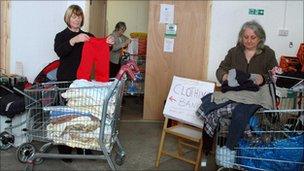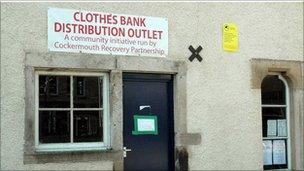Cumbria communities bond to ease misery
- Published

The clothes bank distributed shoes, bedding and cleaning products
In the days and weeks that followed the floods in 2009, the emotional and physical effects were felt across communities in Cumbria.
With families and individuals struggling to cope during the aftermath, neighbours pulled together and teams of aid workers were created.
In total, it is estimated 1,400 people were affected in Cockermouth - one of the worst flood-hit areas.
About 140 residents, of a population of 8,000, are still not in their homes.
Sally Scales, the county council's flood recovery co-ordinator, helped set up a number of initiatives in Cockermouth including the Flood Therapists, Street Angels and the Clothes Bank.
She said: "From such terrible devastation, something quite magical has come from this.
"We have had some entrepreneurial responses, and it means that the town has bounced back.
"From relationships that have formed, the town will benefit for a long time to come.
"But we are always mindful there are residents that are still not back in their homes."
The Street Angels initiative was developed by Churches Together In Cockermouth (CTIC), to ensure the welfare of those affected by the floods.
Kathleen Gibson co-ordinates a group of 30 volunteers who make daily visits to residents across the town.
Ms Gibson said: "Basically the volunteers knock on doors and ask if residents are OK."
She said among those they had helped was a 96-year-old woman who had to move from her home because she had been flooded.
Another woman, who had suffered a stroke, had also needed advice and regular assistance.
Despite the hard times, Ms Gibson said the majority of people were looking positively towards the future.
Massage treatments
She added: "These last few weeks we have had quite a lot of rain, and there has been many people worrying about whether we will flood again."
The Flood Therapists initiative - which offers reiki, homeopathy and various relaxation and massage treatments - is subsidised by the Cumbria Flood Recovery Fund.
Organisers decided it needed to be extended longer term, due to its popularity and the way in which people recover psychologically from such ordeals.
Two clinics, the North Lake Clinic and Lorton Clinic, joined to provide the service throughout the week.
It was established after it became obvious there were many people who were finding it difficult to cope with the shock and stress, after the floods.
Therapist Maureen Lawrie said: "A lot of people have been busy for a long time. And then they start to think about having 'me' time. This is usually when they are back at their homes and the exhaustion has kicked in."
Miss Lawrie said they referred people to their doctor if they felt they needed more help recovering from their ordeal.
Cumbria County Council said 198 people in affected areas had sought psychological help in the last year through Cumbria Partnership NHS Foundation Trust.

Age UK helped sort through the clothes and distribute
The clothes bank project emerged within the first few days of the flood aftermath.
Ms Scales said: "Initially a large amount of clothing, bedding and wellies descended on Cumbria and there was a group of volunteers set up to help gather that.
"It started to become obvious the job was much bigger. We needed to take that and sort something more sustainable."
The clothes bank also distributed shoes, bedding and cleaning products - depending on what was needed at the time, as the recovery process moved on. The team comprised six volunteers and a manager.
The clothes bank ran for nearly a year and concluded at the end of October.
- Published19 November 2010
- Published29 October 2010